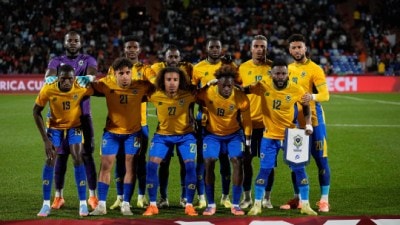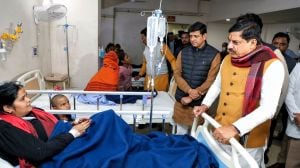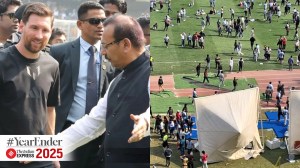Caught in the crossfire
Since India is playing a leading role in the peacekeeping operations in Sierra Leone, the complicated political, economic, ethnic interest...

Since India is playing a leading role in the peacekeeping operations in Sierra Leone, the complicated political, economic, ethnic interests at play need to be understood. All these, and many more factors are involved in the crisis when rebels took several hundred peacekeepers hostage. They are in the process of being released in batches.
The present armed peacekeeping mission was, in fact, preceded by a UN observer mission. The chief military observer on that occasion was Brig. S. Joshi. The Lome peace agreement, which brought the brutal civil war to an end, led to the need of the present UN peacekeeping mission to keep the peace.
As has been the pattern in recent African conflicts, neighbouring countries either nibble or get involved as partisans or honest broker. Nigerian army, had, likewise, played a role during the Sierra Leone conflict, coming directly into combat with the rebel leader, Foday Sankoh8217;s Revolutionary United Front.
Sankoh, meanwhile, has been a protege of Liberia8217;s President Charles Taylor. Liberia happens to be Sierra Leone8217;s eastern neighbour. Foday Sankoh and Taylor, though in separate countries, shore a common interest in Sierra Leone8217;s famous diamonds. In war, or peace, the two, among others, have had access to the diamond mines around the eastern towns of Koidu, Sefadu and Yomadu. These towns are within stone8217;s throw of the Liberian border making Liberia a conduit for diamond smuggling.
However, Foday and Taylor are not the only ones interested in diamonds. Everyone is. Britain, having been the imperial power, has a very legitimate interest. Remember the Sandline company scandal at the earlier stages of the present Labour establishment in London? Well, Sandline was involved in organising a coup in Sierra Leone. This is the gossip in Freetown as well as at the UN. Branch Energy in Sierra Leone is a UK-based company and, interestingly, can deploy armed security guards.
Little wonder, Britain acted rather more swiftly than others when it appeared that the civil war would erupt all over again. Sir Charles Guthrie, Britain8217;s chief of army staff, visited Freetown. Aircraft carrier HMS Illustrious headed for Freetown with over 600 marines to reinforce the paratroopers. A British fleet with Harries and attack helicopters is anchored off the coast. Ostensibly all of this is to enable British citizens to be evacuated at short notice.
When one country8217;s national interest is consistent with the general interest, I suppose we must all applaud the effort. The effect of the British intervention has been that the airport is now secure and Gen. Vijay Jetley, Commander of the peace force, has been able to deploy a very efficient Jordanian force in the Freetown area.
The flip side of the British show of strength is that, with heavy media support, it stands out in something of a contrast to the peacekeeping forces, hundreds of their soldiers having been taken hostage by the rebels.This UN peacekeeping mission is under Chapter 6 of the UN charter. In other words, maintain the peace without use of force.
But what happens if the peacekeepers are attacked or their headquarters invaded? Well, in such circumstance peacekeepers may use provisions of Chapter 7 which permits use of force. The UN mission in Sierra Leone is under the overall rubric of Chapter 6 but quot;provisions of Chapter 7 may be usedquot; to provide protection to government buildings, safe passage to citizens or when large-scale violence is imminent.
Obviously, this is not an easy mandate to interpret or implement. Who will decide that the situation at a given time warrants the application of Chapter 7? There are contingents from Ghana, Guinea, Nigeria, Kenya, Jordan and, of course, India. The Bangladeshis are yet to be deployed.
It is conceivable that the neighbouring African countries involved have an quot;attitudequot;, a quot;slantquot; towards one or the other groups involved in the Sierra Leone internal conflict. The Nigerians, for instance, might seek a more quot;robustquot; mandate, an unambiguous Chapter 7 mission, which would fight and defeat one of the parties in the conflict. Since the Nigerians have already been in combat with Foday Sankoh, that precisely is the faction they would like to eliminate.
This point of view, should it ever prevail, would nullify whatever public relations the peacekeeping force, under Gen. Jetley, has been able to forge with both sides.
In fact, experience shows that Indian peacekeeping forces in theatres like Somalia and Angola performed outstandingly well because of their innately quot;non-alignedquot; stance. In Mogadeshu, Gen. Mono Bhagat was as influential with Farah Aideed as he was with Aideed8217;s arch rival Ali Mahdi. In Angola, Gen. Saxena was equidistant between President Dos Santos and Jonas Savimbi who, too, like Foday, lives off smuggled Angolan diamonds.
The unfavourable glare of publicity on Sierra Leone peacekeeping has exposed the difficulties in creating a cohesive force out of disparate troops, trained and equipped under different dispensations.
Peacekeeping is a great experiment in multiculturism when the going is good. But when a crisis erupts, as happened in Sierra Leone, and the competent and the brave stand out in contrast to troops who, in this instance surrendered to the rebels without any resistance, everyone looks for scapegoats. An element of racism also enters the proceedings.
The allegedly critical remarks by the UN Secretary General, Kofi Annan, about Gen. Jetley have been blown out of all proportions by interested groups lobbying with a section of the media. Annan is from Ghana and all key African countries were involved in the debacle now under control. He was under pressure to protect his African flank. In fact, no UN Secretary General has ever singled out India for such high praise in peacekeeping as Kofi Annan has done. He said so even in a TV interview with me.
Meanwhile, the US does not know which way to look on this issue. The American heart bleeds for Africa, but the country cannot commit money or troops to save Africa. Congress will not allow extra funds. So some way has to be found outside the UN framework. Operate through the Nigerians for instance!
This again complicates life for Gen. Jetley by whom we must stand at all costs should some cunning lobbies be active to seek a change to cover up their shame.
- 01
- 02
- 03
- 04
- 05






























